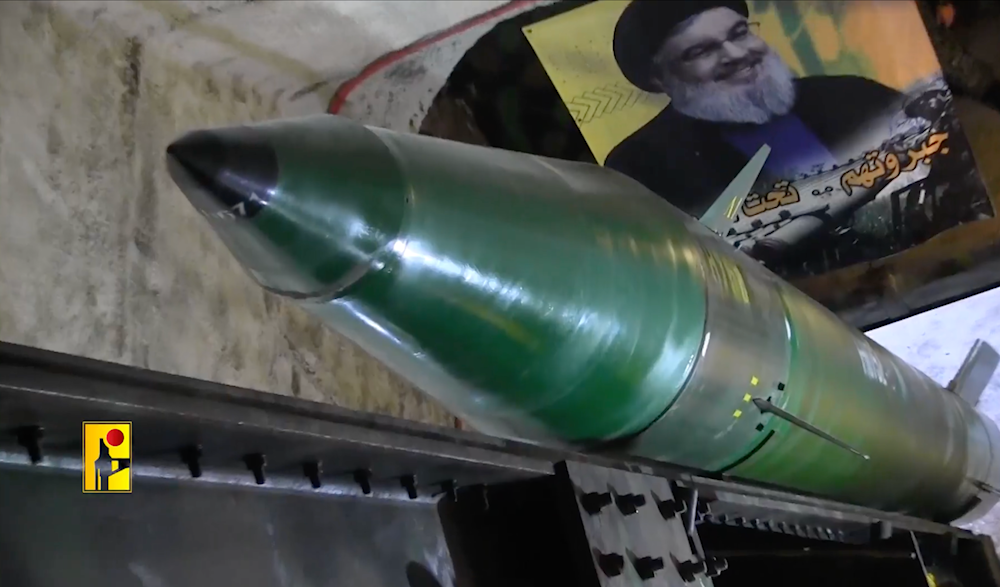Despite Israeli strikes, Hezbollah hitting back: WSJ
A report published in The Wall Street Journal highlights that despite heavy Israeli strikes and the assassination of its commanders, Hezbollah demonstrated its ability to regroup quickly under pressure.
-

A Qader-2 missile is mounted and prepared for launch toward Tel Aviv, occupied Palestine, by the Islamic Resistance in Lebanon in an undisclosed location, October 23, 2024. (Islamic Resistance Military Media)
Hezbollah's attacks, despite being weakened by the series of blows that killed a generation of its senior leaders and destroyed some of its weapons, are still capable of turning the most aggressive decades-long conflict in Lebanon into a lengthy war of attrition against "Israel", The Wall Street Journal highlighted.
According to the newspaper, "though weakened", Hezbollah is still fighting back, with its escalating reactions risking an extended war.
It further stressed that Hezbollah is resisting and ambushing Israeli forces in Lebanon, while launching drone and missile attacks deep in occupied territories.
In this context, the WSJ emphasized that while Hezbollah's year-long attacks against occupied territories, which came in support of the Palestinians, allegedly did not inflict heavy damages or cause casualties, they still managed to displace thousands of settlers from the occupied north and drained Israeli resources as the occupation scurries and spends more to intercept them.
Elsewhere, the newspaper viewed that the Israeli military's incursion into South Lebanon was supposed to force Hezbollah to halt its attacks, however, it only increased their severity.
Hezbollah's drone-missile capacity
The newspaper discussed the drone attack carried out by Hezbollah on the residence of Israeli Prime Minister Benjamin Netanyahu in Caesarea, located more than 40 miles from the Lebanese border, noting that this was the second time in a week that the group has demonstrated its ability to breach Israeli air defenses using drones.
It highlighted a video released by Hezbollah last Monday, showing the bombing of a group of Israeli soldiers in the village of Ramia in southern Lebanon. The report stated that "the video, filmed from the rocket itself, shows the use of guided anti-tank missiles by the group, which were among its deadliest weapons during the last war with "Israel" in 2006.
The article mentioned that Hezbollah's rocket fire has increased, with 200 rockets and shells launched each day over the weekend and 140 on Tuesday, according to the Israeli occupation military, while in previous weeks the average was only a few dozen per day.
It claimed, however, that Hezbollah's rocket launches are still fewer than what Israeli officials expected in the event of a full-scale war, indicating a "decline in the group's capabilities."
Nevertheless, Hezbollah demonstrated its ability to regroup quickly under pressure, according to the WSJ, which cited military analysts stating that the Lebanese group's units have trained to operate with a certain degree of independence. This makes it easier for them to continue fighting even when senior leaders are martyred and internal communications are disrupted.
Hezbollah kills 70+ Israeli soldiers and destroys 28 tanks in Lebanon
On Wednesday evening, the Islamic Resistance in Lebanon's operations room issued a field summary of the ground confrontations between Hezbollah fighters and Israeli occupation forces in southern Lebanon, at the border with occupied Palestine. It highlighted the achievements of Hezbollah's missile force, air force, and air defense forces.
The operations room report confirmed the continued resistance to the Israeli aggression on Lebanon, inflicting heavy losses on the Israeli occupation forces in terms of personnel and equipment across the five axes of confrontation, extending from Lebanon's border towns into occupied Palestine.
According to the Resistance's assessment, Israeli losses include more than 70 dead and 600 injured among Israeli occupation officers and soldiers, along with the destruction of 28 Merkava tanks, four military bulldozers, an armored vehicle, and a troop carrier. Additionally, three Hermes 450 drones and one Hermes 900 drone were downed.
This tally does not include the losses sustained by the occupation forces at bases, military sites, and barracks in northern and deeper areas of occupied Palestine, as noted by the Islamic Resistance operations room in Lebanon.
Regarding ground confrontations, the operations room emphasized that Israeli occupation forces have been unable to control or occupy any village along the frontlines fully.
The report outlined recent ground confrontations, highlighting several failed attempts by Israeli forces to advance toward villages on the frontlines in an effort to capture and control them.

 4 Min Read
4 Min Read








